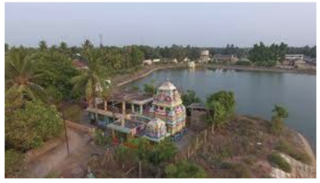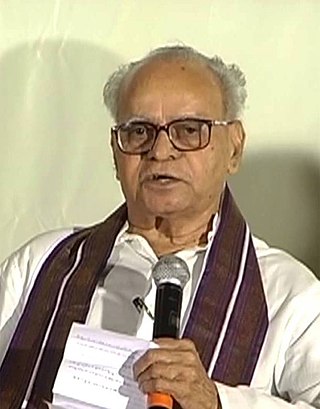
Tirupati Venkata Kavulu refers to the Telugu poet duo Divakarla Tirupati Sastry (1872–1919) and Chellapilla Venkata Sastry (1870–1950). These twin poets are acclaimed as the harbingers of modern poetry in Telugu. They have dramatised several of the Hindu epics into dramas and plays consisting of singable verses set to perfect meter. Several of their plays, especially pandavodyogavijayalu have been extremely popular with many drama clubs and audiences across Andhra Pradesh. Venkata Sastry has trained a large number of later age poets including Viswanatha Satyanarayana, Pingali Lakshmikantam and Veturi.

Telugu literature is the body of works written in the Telugu language. It consists of poems, short stories, novels, plays, and song lyrics, among others. There is some indication that Telugu literature dates at least to the middle of the first millennium, the first extant works are from the 11th century when the Mahabharata was first translated to Telugu from Sanskrit by Nannaya. The language has experienced a golden age under the patronage of the Vijayanagara Emperor-Poet Krishnadevaraya.
Avadhānaṃ is a literary performance popular from the medieval era in India. Avadhānaṃ was originated and primarily cultivated among Telugu poets. It involves the partial improvisation of poems using specific themes, metres, forms, or words. The true purpose of an Avadhanam event thus is the showcasing, through entertainment, of superior mastery of cognitive capabilities - of observation, memory, multitasking, task switching, retrieval, reasoning and creativity in multiple modes of intelligence - literature, poetry, music, mathematical calculations, puzzle solving etc.
Tummala Seetharama Murthy or Tummla Seetharama Murthy Choudary (1901–1990) was an Indian poet writing in Telugu.
Mallampalli Sarabheswara Sarma, popularly known as 'Sarabhayya', was a well-known Indian poet, critic, translator and exponent of classical literature.
Malladi Chandrasekhara Sastry was an Indian scholar and television personality who specialized in the Vedas and Puranas texts in the Telugu and Sanskrit languages. His works have included commentaries on All India Radio during Bhadrachalam's Sitarama Kalyanam and Brahmotsavam festivals. For Ugadi day, he recited the Panchanga Sravanam. On television he hosted a show Dharma Sandehalu and Dharma Sukshmalu where he answered questions regarding the Purana and various aspects of Hinduism. The show is telecast on the Sri Venkateswara Bhakti Channel and formerly on the Doordarshan Saptagiri Channel. He was the principal of a college run by the trust named Tirumala Tirupati Devasthanams where they do pravachan (lectures) on the Puranas. He received the Raja-Lakshmi Award in 2005, and has also been conferred the title of Purana Vachaspati.

Vedam Venkataraya Sastry was a Sanskrit and Telugu language poet, critic, Telugu theatre star and dramatist. He is known for providing authoritative editions of Sanskrit and Telugu classics.

Veturi Prabhakara Sastri was a Sanskrit and Telugu scholar, editor, translator and historian. He was born in the town of Pedakallepalli in the Krishna District of Andhra Pradesh. He was known for deciphering a few thousand of Annamayya's composition during his tenure at the Devasthanam Oriental Institute. He is also recognized for his scholarship on Telugu poet Srinatha's work. Veturi was involved in researching lost texts and forgotten literature, and he is regarded for his enlightened and liberal scholarship that was free of literary or religious prejudices.

Rallapalli Ananta Krishna Sharma was a noted composer of Carnatic music, singer, Telugu litterateur, teacher and Sanskrit scholar. He was responsible for discovering, cataloguing and putting to music many forgotten compositions of Annamacharya. These compositions composed hundreds of years ago came back to life thanks to Sharma's efforts and successive singers like S. P. Balasubramanyam and M. S. Subbalakshmi would sing many of them, hence popularising them. Sharma authored prose works like Vemana, Natakopanyasamulu,Ganakale,Sahitya Mattu Jeevana Kale and Saraswatalokamu. Rallapalli Ananta Krishna Sharma translated 395 Gathas from original Prakrit into Telugu language titled Shalivahana Gatha Sapta Saramu in 1931. Sharma is the recipient of Central Sangeet & Natak Academy Fellowship (1973), Gana Kala Sindhu (1961), Gana Kala Prapoorna (1969), Sangeeta Kala Ratna (1974) and Sangeeta Sahitya Asthan Vidwan honours with a Honorary Doctorate from TTD University, Andhra Pradesh.
Rambhatla Lakshminarayana Sastry(b: 9 December 1908 - d: 19 November 1995) was an eminent Indian teacher, author, playwright, translator, commentator and speaker in Telugu & Sanskrit languages. Sastry's life and notable works have been documented and covered in Telugu University under Luminaries of 20th Century.

Viswanatha Satyanarayana was a 20th-century Telugu writer. His works included poetry, novels, dramatic play, short stories and speeches, covering a wide range of subjects such as analysis of history, philosophy, religion, sociology, political science, linguistics, psychology and consciousness studies, epistemology, aesthetics and spiritualism. He was a student of the illustrious Telugu writer Chellapilla Venkata Sastry, of the Tirupati Venkata Kavulu duo. Viswanatha's wrote in both a modern and classical style, in complex modes. His popular works include Ramayana Kalpavrukshamu, Kinnersani Patalu and the novel Veyipadagalu. Among many awards, he was awarded the Jnanpith Award in 1970, the first for a Telugu writer, and Padma Bhushan in 1971.
Divakarla Tirupati Sastry was a Telugu poet and scholar. He was one of the two poets known as Tirupati Venkata Kavulu and other being Chellapilla Venkata Sastry.

Munganda is a village in East Godavari district of the Indian state of Andhra Pradesh. It is located in P.Gannavaram mandal of Amalapuram revenue division. and is part of Konaseema.
Mahamahopadhyaya is an honorific title given to prestigious scholars by the Government of India. Prior to 1947, the title was bestowed by the British Raj, and before them, by the kings of ancient India. In ancient India, a scholar that wrote works based on topics related to the shastras was granted the title Mahopadhyaya. The title Mahamahopadhyaya was bestowed on the best amongst the Mahopadhyaya scholars.

Dr. Pullella Sriramachandrudu was an Indian scholar of Vedanta, Vyakarana and Alankara Sastra and a prolific writer of Sanskrit and Telugu literature. He was widely credited with several books in Sanskrit and Telugu and was best known for translating many difficult Sanskrit works into Telugu the seven volume Telugu edition of the Indian epic, Ramayanam by Valmiki. The Government of India has honored Pullella Srirama Chandrudu in 2011, with the fourth highest civilian award of Padma Shri.
Bellamkonda Ramaraya Kavindrulu (1875–1914) was an Indian poet, author, yogi, Sanskrit scholar and a philosopher.
Abburi Ramakrishna Rao was a pioneer of modern Telugu literature. He was a progressive Telugu writer, scholar, novelist, playwright, literary critic, humanist, professor of Library Science, and the Librarian. Gurajada Apparao, Rayaprolu Subbarao, and Abburi Ramakrishna Rao were considered as the trio of modern poetry, as all their works were published in the same period.

Korada Mahadeva Sastri was an Indian linguist. His classic work Historical Grammar of Telugu was the first systematic study on the development of Telugu Language. It provides a survey of the historical development of the Telugu Language from the earliest times. This work helped decipher some Indus Valley seals. He was a founder member of the Dravidian Linguistics Association of India. He was awarded the 2011 C.P.Brown award and Sri Kalapurna award for his lifetime achievements.
Kondaveeti Venkatakavi is an Indian poet, scholar, and film writer from Andhra Pradesh. He is well known for writing dialogues in the movie Daana Veera Soora Karna.









